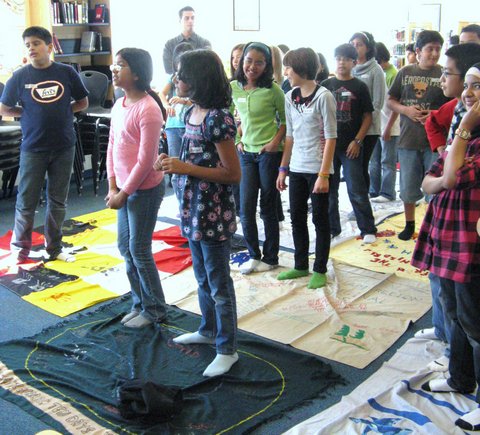Like this article? rabble is reader-supported journalism. Chip in to keep stories like these coming.
If we give them a chance, kids can help end racism against Indigenous people in Canada. And the best chance we can give them is through the schools.
Racism against Inuit, First Nations, and Métis people still thrives in Canada. The deaths of First Nations students in Thunder Bay, the inquiry into missing and murdered Indigenous women, and the forced closure of online comments related to stories about Indigenous peoples are only three examples of this harsh reality.
The Truth and Reconciliation Commission of Canada (TRC) revealed that throughout the 130-year residential school period, which ended in the 1990s, Indigenous children learned that Aboriginal cultures were inferior to those of Europeans and Christians. And at the same time, other Canadians learned the same thing. Racism against Indigenous peoples has been taught and learned.
But it can be unlearned. And new knowledge can change attitudes and behaviours. We see that every day at KAIROS. Our popular education tool, the KAIROS Blanket Exercise, engages people of all ages in an interactive experience of the history of colonization in Canada, with information drawn from the comprehensive 1996 Report of the Royal Commission on Aboriginal Peoples, and new insights from the recent TRC process.
Participants learn about vibrant First Nations governments and cultures prior to European contact, the changing relationship between settlers and Indigenous peoples, and the unrelenting attempts by the Crown, and then the Canadian government, to assimilate Indigenous peoples and eradicate cultures, languages and identities. Participants also learn about the resistance and resilience of Indigenous peoples.
Following the exercise, virtually every participant asks: “why didn’t I know ?” And some, particularly students, are candid about how it has changed their attitudes. Some publicly apologize for what they now recognize as their own racism. A grade eight student said: “I now know how much Indigenous peoples have gone through and I will never forget.”
In its 94 Calls to Action, the TRC focuses on education and in one call (62.i), the Commissioners urge each province and territory to make this history, as well as the Treaties and Indigenous peoples’ historical and contemporary contributions to Canada, mandatory education requirements for every grade — from kindergarten to grade 12.
Across the country, teachers, school boards and ministries are responding. A Report Card prepared by KAIROS and the Legacy of Hope Foundation shows that while some provinces and territories are clearly moving in the right direction on implementing Call 62.i, in other jurisdictions there is still a lot of work to do, even where public commitments have been made. Currently there is very little mandatory curriculum in Ontario that covers Indigenous issues, however, the province recently announced that it is developing a plan in line with Call 62.i.
Some will argue that this is one more burden on an already overburdened public school curriculum. But, we see teachers hungry for the support, training, and authority that mandatory curricula can help generate. It is as much about teaching the history of Canada differently as it is about teaching more. Innovative educators have been led by the wisdom of Indigenous elders to “teach differently” across the curriculum, bringing diverse Indigenous insights into art, science, languages, even sports.
Sadly, most parents don’t have the information to educate their children on the history of colonization, on Treaties and on the contributions of First Nations, Inuit, and Métis people. Many are products of the flawed Canadian education system, or inadequate newcomer education, correction of which is also addressed in Call to Action 93.
The persistent separation between Indigenous and many settler and newcomer communities means that there are too few examples of true relationships that can profoundly change learned historical ignorance. When kids get it, when learning builds empathy and insight, they can challenge parental attitudes that block efforts to end racism and move towards reconciliation.
We can end the ignorance and falsehoods about our history in one generation if provincial governments ensure that all Canadian students learn about the experiences of Indigenous peoples in Canada. If we teach our children the truth, they can be leaders in the critically important work of ending racism and bringing about reconciliation in our country.
This year, on the International Day for the Elimination of Racial Discrimination, let’s commit to giving our children the tools so that — Indigenous and non-Indigenous together — they can lead us towards right relations in this country.
Jennifer Henry is the executive director of KAIROS Canada. KAIROS and Legacy of Hope are currently running a petition campaign for implementation of TRC 62i related to mandatory curriculum.
For more on KAIROS’ and Legacy of Hope’s Education for Reconciliation initiative, visit: kairoscanada.org/what-we-do/indigenous-rights/windsofchange-overview
Like this article? rabble is reader-supported journalism. Chip in to keep stories like these coming.



